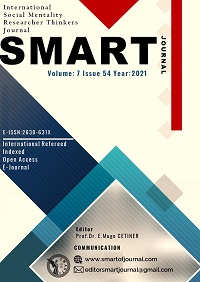Author :
Abstract
Klasik Türk edebiyatı Kur’ân-ı Kerîm ve hadisler gibi dinî metinler başta olmak üzere, tarihi ve felsefi içerikli kaynaklardan, tıp ve astronomi gibi pozitif bilimlerden; özellikle Fars, Hint, Arap gibi kadim kültürlere ait mitoloji ve anlatılardan çokça beslenmiş; bu tür kaynaklardan anlam zenginliği çerçevesinde beslenmiştir. Bu minvalde kadim dinî metinlerden de yararlanılmış, dinî-efsanevi hususiyetleri iç içe geçmiş pek çok şahsiyete eserlerde yer verilmiştir. Bu dinî-efsanevi kahramanlardan biri de Hz. Süleyman’dır. Bir peygamber ve hükümdar olan Hz. Süleyman, Kur’ân-ı Kerîm’de adı geçen ve hakkında pek çok rivayet bulunan bir şahsiyettir. Cinlere, hayvanlara ve rüzgara hükmetmesi, mührü, devlerle olan mücadeleri, haberci bir hüdhüd kuşunun olması, Seba melikesi Belkıs’ı dine davet etmesi, tahtının rüzgarla hareket edebilmesi, karınca ile olan muhavereleri gibi özellikleri ve rivayetleri onun klasik metinlerde en çok adı geçen kişiliklerden biri olmasını sağlamıştır. Bu çalışmada klasik şiirde Hz. Süleyman çevresinde oluşturulan anlam hususiyetlerinden kısaca bahsedilmiş, onun vefatının edebiyatta ne şekilde işlendiği üzerinde detaylı olarak durulmuştur. Ayrıca peygamberlerin kıssalarının derlendiği bir mecmuada tespit edilen Hz. Süleyman’ın vefatı ile ilgili kıssası çeviri yazı yöntemi ile Latin alfabesine aktarılmış, dil ve muhteva olarak değerlendirilmiştir.
Keywords
Abstract
Classical Turkish literature has been greatly nourished by and gained a richness of meaning from historical and philosophical sources, especially religious texts such as the Qur’an and hadiths, positive sciences such as medicine and astronomy, mythology and narratives of ancient cultures such as Persian, Indian and Arab cultures. Ancient religious texts were also used in this way, many personalities whose religious-mythical aspects are intertwined have been included in the works. One of the religious and legendary heroes mentioned is Solomon. Solomon, a prophet and ruler, is a personage mentioned in the Qur'an and about whom there are many narrations. His rule over jinns, animals and the wind, his ring, his struggle with the giants, the presence of a messenger bird of hudhud, The sultan of Seba invited Belkıs to religion, the ability of the throne to move with the wind, his conversations with ant features and narrations such as he ensured that he became one of the most mentioned personalities in classical texts. In this study, the meaning aspects created around Solomon in classical poetry are briefly mentioned, it is focused in detail on how his death is processed in literature. In addition, the parable of about the death of Solomon, which was discovered in a journal that compiled the parables of the prophets, was rewritten in the Latin alphabet with the translation method, and it was evaluated in terms of language and content.
Keywords
- Altun, K. (1999). Gelibolulu Ali ve Divanı (Vâridâtü’l-Enîkâ), Özlem Kitapevi, Niğde.
- Altun, K. (1999). Gelibolulu Ali ve Divanı (Vâridâtü’l-Enîkâ), Özlem Kitapevi, Niğde.
- Argunşah, M. (1994). “Bitlisli Şükri’nin Yavuz Sultan Selim Mersiyesi”, Erciyes Üniversitesi Sosyal Bilimler Enstitüsü Dergisi, 5: 211-220.
- Arslan, M. (2011). Şeref Hanım Dîvânı, Kitabevi Yayınları, İstanbul.
- Balbaba, S. (2009). “Kemal Ümmî Divanı Tenkitli Metin İndeks”, Yüksek Lisans Tezi,: Kahramanmaraş Sütçü İmam Üniversitesi Sosyal Bilimler Enstitüsü, Kahramanmaraş.
- Bice, H. (2015). Hoca Ahmed Yesevî Divan-ı Hikmet, H Yayınları, İstanbul.Bilkan, A. F. (1997). Nâbî Divanı, Milli Eğitim Bakanlığı Yayınları, İstanbul.
- Çavuşoğlu, M. (1977). Yahyâ Bey Dîvan, Edebiyat Fakültesi Basımevi, İstanbul. Çelebioğlu, Â. (trsz.). Kitab-ı Muhammediyye I, Tercüman Yayınları.
- Çeltik, H. (2017). Ahmed-i Rıdvân Divanı, Kültür ve Turizm Bakanlığı Yayınları, Ankara. http://ekitap.kulturturizm.gov.tr (02.10.2021).
- İsen, M. (1990). Usûlî Divanı, Akçağ Yayınları, Ankara.
- İsen, M. (1994). Acıyı Bal Eylemek Türk Edebiyatında Mersiye, Akçağ Yayınları, Ankara. Keskinkılıç, E. (1999). Sultan II. Osman, Şule Yayınları, İstanbul.
- Küçük, S. (1994). Bâkî Divanı, Türk Dil Kurumu Yayınları, Ankara.
- Onay, A. T. (2014). Açıklamalı Divan Şiiri Sözlüğü (Haz. Cemal Kurnaz), Kurgan Edebiyat Yayınları, Ankara.
- Pala, İ. (1998). Ansiklopedik Divan Şiiri Sözlüğü, Ötüken Yayınları, İstanbul. Parlatır, İ. (2014). Fuzulî Türkçe Divan, Akçağ Yayınları, Ankara.
- Selman, A. M. & Sümbül, A. (2011) Mısrî Niyâzî Divânı, Şemseddin Yeşil Kitabevi, İstanbul. Tokel, D. A. (2000). Divan Şiirinde Mitolojik Unsurlar, Akçağ Yayınları, Ankara.
- Tokel, D. A. (2006). “Süleyman”, Türk Dünyası Edebiyat Kavramları ve Terimleri Ansiklopedik Sözlüğü, (VII): 350-357, Ankara.
- Türk, H. (2020). “Orhan Veli Kanık’ın Kitabe-i Seng-i Mezar’ı” (Ed. Fatih Sakallı), Vefatının 70. Yıldönümünde Bir Garip Orhan Veli, ss. 27-38, İlbilge Yayınları, Ankara.
- Türk, H. (2021). Çağdaş Türk Şiiri Tarihi, Paradigma Yayınları, Çanakkale.
- Zavotçu, G. (2006). Divan Edebiyatı Kişiler Kişilikler Sözlüğü, Aydın Kitabevi, Ankara. EK





